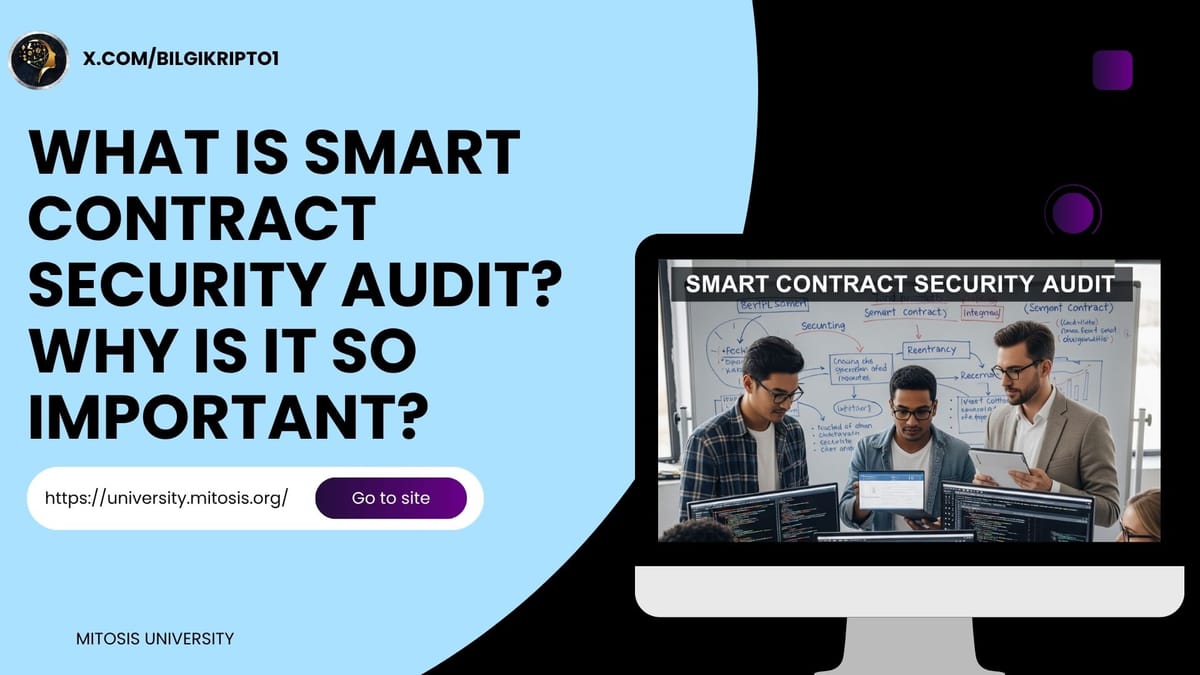What Is Smart Contract Security Audit? Why Is It So Important?

Smart contracts, one of the fundamental building blocks of blockchain technology, enable automatic, reliable, and transparent transactions. However, even the smallest error or security vulnerability in the code of these contracts can lead to losses worth millions of dollars. That is why smart contract security audits are of great importance.
In this article, the concept of smart contract auditing, why it is critical, how it is performed, and what should be considered will be discussed in detail. Additionally, information about the most preferred auditing methods and firms in the industry will be provided.
What Is Smart Contract Audit?
Smart contract auditing is the comprehensive examination of the contract codes used in a blockchain project. The purpose is to identify whether there are any security vulnerabilities, logical errors, or performance issues within the code. Through this review:
- Potential attack points are identified.
- Theft of funds or malicious use of the contract is prevented.
- The long-term reliability of the project is ensured.
In summary, this process is a thorough security test designed to detect critical software issues in advance.

Why Should Smart Contract Audits Be Conducted?
Blockchain transactions are irreversible due to their fundamental nature. This means that once an error or attack occurs, it is almost impossible to recover the loss. For example:
- DAO Attack in 2016: Approximately $60 million worth of ETH was stolen due to a vulnerability in an Ethereum smart contract. This event led to a hard fork on the Ethereum network.
Such major incidents clearly demonstrate how vital auditing is. Even a small coding error can cause losses worth hundreds of thousands or even millions of dollars.
How Is Smart Contract Auditing Performed?
The auditing process generally consists of four basic steps:
- Defining the Scope: Which contracts, their features, and the purposes of the audit are determined. The project's goals and operations are understood in detail.
- Code Analysis: The entire contract code is thoroughly examined using both manual and automated tools. Logical errors, security vulnerabilities, and performance issues are identified.
- Initial Report Preparation: Detected issues are reported in detail and communicated to the project team.
- Corrections and Final Report: After the project team addresses the issues, auditors perform final checks and prepare the final report.
Every phase of this process is carried out meticulously to increase the project's reliability.
What Are the Most Common Security Vulnerabilities?
During audits, particular attention is paid to the following critical security vulnerabilities:
1. Reentrancy Vulnerability
This occurs when a contract calls another contract, and the called contract can recursively call back the original contract, potentially causing unexpected behaviors. This vulnerability can lead to multiple withdrawals of funds.
2. Integer Overflow and Underflow
Errors occur when the result of a mathematical operation exceeds the maximum or minimum value the program can store. This can cause incorrect balance calculations or transaction errors.
3. Front-Running Risk
This risk involves the prediction of contract transactions in advance, allowing malicious actors to execute transactions that harm other users. It is commonly seen in market manipulation.

Impact on Performance and Gas Fees
On blockchains like Ethereum, transactions require a "gas" fee per operation. Efficiently written smart contracts keep these fees low. Inefficient code increases user costs and can congest the network.
For example, a simple token transfer may require 2 lines of code, whereas a poorly written contract might use 8 lines, resulting in four times higher transaction fees for users.
Auditing Is Not Limited to Code Alone
Smart contract auditing covers not only the contract code but also the blockchain network infrastructure, APIs, and user interfaces involved. Many attacks occur not directly on the code but through these components.
For instance, a DDoS attack or a malicious user interface can put users’ funds at risk.
What Is an Audit Report and What Does It Include?
At the end of the audit, a report is presented to the project and the community, containing:
- All identified errors and vulnerabilities,
- Severity levels of vulnerabilities (critical, major, minor),
- Necessary corrections,
- Status of the corrections,
- Performance improvement suggestions.
For transparency, serious projects publish these reports on their official websites.
Trusted Smart Contract Audit Firms
The most prominent and trusted firms in the industry include:
- CertiK: Has audited major projects like PancakeSwap and Venus. Highly reputable and an industry leader.
- ConsenSys Diligence: Founded by Ethereum co-founder Joseph Lubin, offering deep analysis for Ethereum contracts.
How Much Does a Smart Contract Audit Cost?
The cost of an audit depends on factors such as:
- Number and complexity of contracts to be audited,
- Reputation and experience of the audit firm.
Typically, audits for small to medium projects range between $3,000 and $10,000, while costs can be significantly higher for larger projects.
Conclusion: The Most Critical Step for Security
Smart contract auditing ensures investor safety and guarantees the sustainability of projects. Reading audit reports carefully before investing helps you make informed decisions.
Developers must also conduct comprehensive audits before launching their projects to gain credibility and prevent potential large losses.
Frequently Asked Questions
Is auditing mandatory?
No, but it has become a standard for trustworthiness.
Does auditing eliminate all risks?
Definitely not, but it significantly reduces them.
What should be considered when investing in new projects?
Audit reports, code transparency, and the openness of the development team are important factors


Comments ()